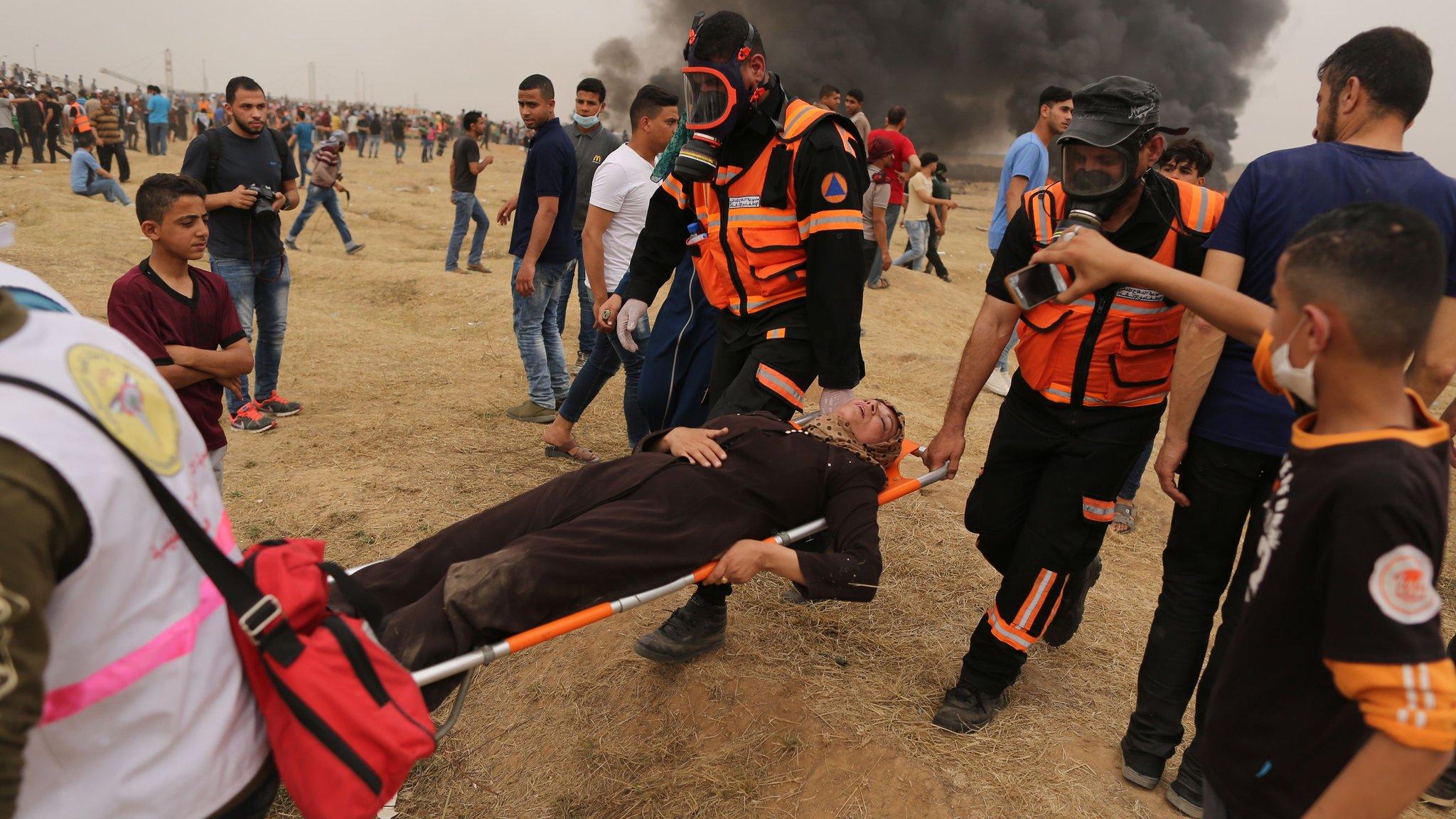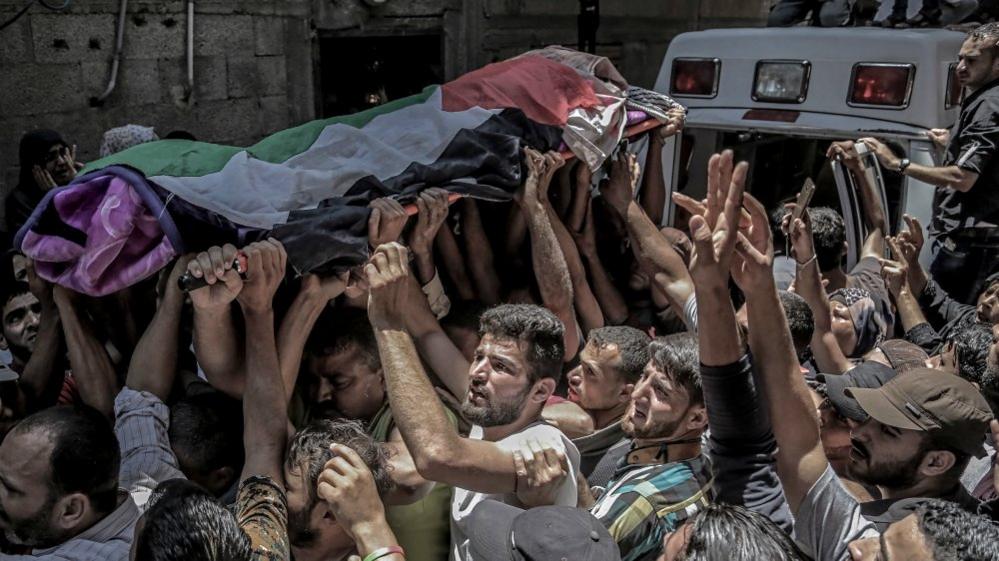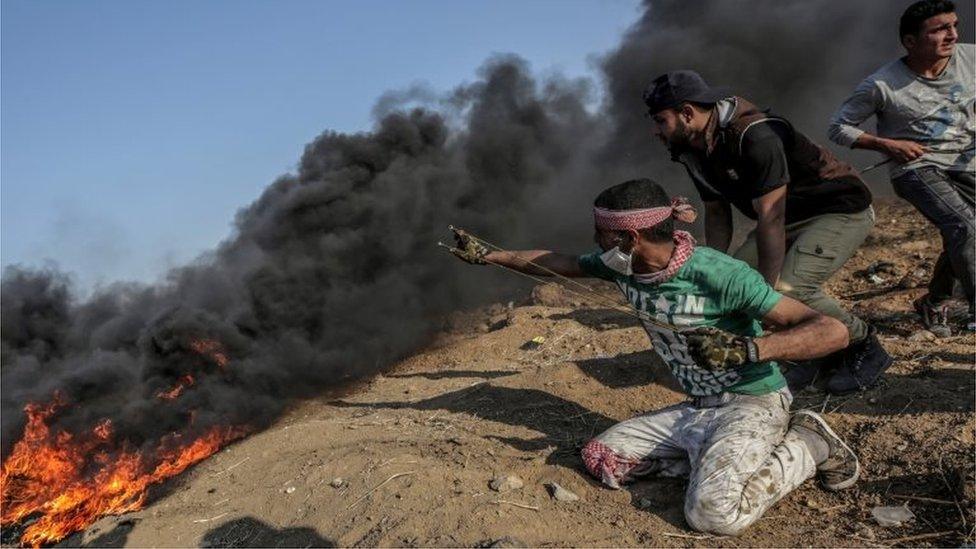May raises concerns with Israel over Gaza violence
- Published
In full: May and Netanyahu on Gaza and Iran
Theresa May has told the Israeli prime minister that the UK is "concerned about the loss of Palestinian lives" during recent protests in Gaza.
She "absolutely recognises" Israel's right to defend itself, she told Benjamin Netanyahu in Downing Street.
But after the deaths of more than 100 Palestinians during the protests, it was time to "find a way through".
Mr Netanyahu said some at the protests had been "paid for and pushed by Hamas" to try to kill and kidnap Israelis.
Palestinian health officials said more than 120 people had been killed and 10,000 injured by Israeli troops over a six-week period between April and May, as a series of protests took place along the border between the Gaza Strip and Israel.
On one day in May, 60 were said to have been killed when 40,000 people took part in demonstrations that coincided with the controversial relocation of the US embassy to Jerusalem.
Last month, Mrs May said the use of live rounds by Israeli forces was "deeply troubling" and urged greater restraint. She also called for an independent investigation into the incident.
On Wednesday, she welcomed Mr Netanyahu to Downing Street, then broached the subject with him face-to-face, and in front of the cameras.
"We have been concerned about the loss of Palestinian lives," she said.
"As you know, the UK absolutely recognises the right that Israel has for self-defence against the activities of extremists and terrorists.
"But with 100 Palestinian lives lost and a deteriorating situation in Gaza, I hope we can talk about how we can alleviate that situation and how we can ensure that we can get back to a position where we are able to find a way through to talk about a two-state solution."
'Not a peaceful protest'
Responding to her comments, Mr Netanyahu said the problems in Gaza were "rooted in the fundamental goal of Hamas to destroy Israel".
He added: "We are not witnessing a peaceful protest. In addition to burning our fields, these people are being paid for and pushed by Hamas to try to break into Israel's defences, kill as many Israelis as they can when they get through the border and kidnap our soldiers.
"This is not a non-violent protest, quite the contrary.
"We are doing everything we can to both minimise casualties and at the same time protect Israeli lives."
The BBC's Middle East editor Jeremy Bowen sent this report from Gaza
Later, Mr Netanyahu met with Foreign Secretary Boris Johnson, who reiterated Mrs May's call for an independent inquiry.
In a statement after the meeting, Mr Johnson said: "The people of Israel and Gaza have the right to live safely in peace, without constant fear for their security.
"We continue to press both Israel and the Palestinian authority on the need to refrain from actions which make peace more difficult."
Allow X content?
This article contains content provided by X. We ask for your permission before anything is loaded, as they may be using cookies and other technologies. You may want to read X’s cookie policy, external and privacy policy, external before accepting. To view this content choose ‘accept and continue’.

During the meeting, the leaders also pledged to discuss Iran.
Mr Netanyahu, who has called for other countries to follow the US and pull out of the Joint Comprehensive Plan of Action (JCPOA), told Mrs May his focus was making sure Iran did not get a nuclear weapon and "how to roll back Iran's aggression in the region".
However, she reiterated her support for the JCPOA, adding: "Along with France and Germany, the UK continues to believe that is the best route to preventing Iran from getting a nuclear weapon.
"We will remain committed to it as long as Iran meets its obligations.
"But we do recognise that there are other issues that need to be addressed in relation to Iran - its destabilising regional activity in countries like Syria and Yemen and also the proliferation of ballistic missiles."
- Published17 May 2018

- Published2 June 2018

- Published18 May 2018
